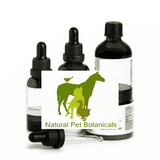A carefully selected blend of natural, plant and mineral ingredients, traditionally known for supporting the immune system and nasal obstructions.
Natural Pet Botanicals Recommendations formulas are both effective and gentle in supporting the whole body, you support your own animal or pet at home, and in almost every single case we improve vitality and longevity. If you are dealing with any metabolic or immune issue with your pet, we suggest that you contact us for a consultation so we can ensure you are using the right products.
* Natural pet botanicals are not intended to replace veterinary care or medication. Our formulas are offered as an alternative health support for your animal's condition and not as a cure. All our oral supplements are to be consumed voluntarily by your animal in food, treats or liquid.
SET OF 4
1. Naso Clear 62-1 formula 50ml
2. AllerEase Inflamo 62-2 formula 50ml
3. Immuno Infect 62-3 mix 100ml
4. Trachi 189-1 formula 30ml
INGREDIENTS AND TRADITIONAL ASSOCIATIONS
Formula 1.
Ash mineral (Hepar sulph 6X) has long been associated in traditional practice with supporting the body’s natural defences and easing irritation, particularly in the respiratory system.
Hydrastis 6X is traditionally valued for its role in helping to clear excess mucus and supporting comfort during times of congestion.
Barium chloride (Baryta muriatica) carries historical associations with easing throat discomfort and supporting tonsil health.
Carbon of barium (Baryta carbonica) has been linked in traditional use with supporting the glands, soothing swelling, and helping maintain balance in the throat and oesophagus.
Poke root (Phytolacca 200X) is traditionally recognised for its strong association with supporting the lymphatic system, particularly in easing glandular swelling and maintaining healthy tissue balance.
Traditonally used for Nasal Polyps -
Calcium carbonate (Calcarea carbonica 200X) has been traditionally associated with supporting healthy tissue structure and maintaining balance in the body’s natural defences.
Blood-leaf (Sanguinaria 200X) carries a long history of use in traditional practice for its connection with respiratory and throat health, particularly in easing irritation and maintaining comfort.
Duckweed (Lemna minor 200C) is traditionally valued for its associations with easing nasal blockage and supporting clearer breathing.
Aurum foliatum (Aurum met 200X) has been linked in traditional use with supporting emotional wellbeing and balance while also being connected with tissue health.
Cat-thyme (Teucrium marum verum 200X) has traditional associations with easing nasal congestion and supporting the health of the sinuses.
Ars Alb is recognised in traditional use for its role in supporting the respiratory tract and has been linked to maintaining healthy vocal cords and throat function.
in 20% USP alc. in purified water.
Reference: https://pubmed.ncbi.nlm.nih.gov/32683037/
Reference: https://www.healthline.com/health/poke-root
Reference: https://pubmed.ncbi.nlm.nih.gov/12639929/
Reference: https://pubmed.ncbi.nlm.nih.gov/15026348/
Fungal and Nasal Health – Educational Notes
Fungal balance: Traditionally, natural ingredients such as Kali bichromicum, Lycopodium, Sticta, Silicea, and Thuja have been associated with supporting balance in cases where fungal overgrowth or related imbalances may be present.
Nasal comfort: Inflammation or obstruction in the nasal passages can lead to discomfort, swelling, and discharges that may be unpleasant or difficult to manage. These symptoms are sometimes linked with sinus congestion or benign growths in the nasal region. Supportive approaches are traditionally aimed at maintaining clearer breathing and nasal health.
Bone and structural integrity: Historical references note that certain conditions may affect the nasal, palatine, or mastoid bones, contributing to discomfort and tissue stress. Supportive strategies in natural health have often focused on nourishment and resilience of tissues.
Adenoids and throat wellness: Enlarged adenoids and tonsils may contribute to recurring throat issues, nasal obstruction, or sleep and swallowing difficulties. Traditional supportive care often emphasizes calming inflammation, easing discomfort, and encouraging balanced respiratory function.
Formula 2.
Small Stinging-nettle (Urtica urens 30C) has long been connected in traditional use with supporting the body’s natural response to seasonal changes and maintaining balance in skin and respiratory comfort.
Chlorhydrate mineral (Histamine 10M) has historically been associated with easing sensitivities, including those described in older records such as headaches, fever, shivering, asthma, and bronchitis.
Psora leaf (Psorinum 30C) is traditionally referenced for its role in helping the body adapt to environmental influences.
Chlorhydrate mineral (Histamine 10M) has also been linked in traditional systems with broader environmental and dietary sensitivities, including those connected to pollen, grasses, perfumes, carbon monoxide, elements in the environment, as well as certain food-based influences such as grains, goat’s milk, egg white, rice, and cheese, alongside responses associated with animal hair and weeds.
in 20% USP alc. in purified water.
Reference: https://pubmed.ncbi.nlm.nih.gov/38560358/
Formula 3.
Isatitis (Isatis tinctoria) has been traditionally valued in Chinese and European herbal practice for its role in supporting the body during seasonal transitions and helping to maintain balance in the immune system. Astragalus (Astragalus propinquus) is long regarded in traditional Chinese medicine as a root that strengthens vitality, builds resilience, and helps the body adapt to stress while supporting immune health.
Chinese Skullcap (Scutellaria baicalensis) has historically been associated with calming and cooling properties, used in traditional systems to support respiratory and immune wellbeing.
Echinacea Aug (Purple coneflower) is one of the best-known plants in Western herbal tradition, long used to encourage immune resilience and natural defences.
Pleurisy Root (Asclepias tuberosa) has traditionally been connected with supporting clear breathing and maintaining comfort in the chest during seasonal changes.
Nettle Leaf (Urtica dioica) has a long-standing place in European folk use as a nourishing herb rich in minerals, often linked with overall vitality and seasonal balance.
Coptis (Coptis chinensis) is a traditional Chinese herb noted for its cooling properties and was historically associated with digestive and immune support.
Sida (Sida acuta) has a long record of traditional use in Ayurveda and folk practices, where it has been valued for maintaining strength, vitality, and balance in the immune system.
Coltsfoot (Tussilago farfara) has been used for centuries in European tradition to support clear airways and seasonal comfort.
Licorice Root (Glycyrrhiza glabra) is one of the most widely used herbs in both Eastern and Western traditions, historically valued for harmonising formulas, soothing the system, and supporting resilience in times of stress.
Formula 4.
Leopard’s Bane (Arnica 1M) has been long valued in European folk traditions where it was connected with recovery and resilience, often linked with supporting the body after physical exertion.
St. John’s Wort (Hypericum 1M) carries a rich history of traditional use for soothing the nerves and encouraging balance of mood and spirit.
Cow-bane, also known as Water Hemlock (Cicuta virosa 1M), was historically referenced in older herbal texts for its strong association with the nervous system. Aconite Nap (1M) has been traditionally described in early sources as a plant connected with sudden changes, often linked with states that appeared quickly and intensely.
Witch Hazel (Hamamelis 200C) is widely recognised in folk practice for its association with toning and cleansing, especially in relation to skin and circulatory comfort.
Wild Rosemary (Ledum 30C) has a long record of traditional use in Northern European cultures where it was valued for supporting resilience following minor wounds and punctures.
Carbon of Barium (Baryta Carb 30C) has historically been referenced in traditional literature for its associations with growth, ageing, and glandular balance.
Bryony Root (Bryonia alb 1M) was traditionally linked with respiratory comfort, particularly during times of seasonal cough.
Bushmaster (Lachesis 200C), derived from a serpent, has been symbolically connected in traditional writings with circulation, transformation, and renewal.
Pot Marigold (Calendula 12X) has a long history in European herbalism where it was valued for supporting skin healing and general vitality.
Yellow Jasmine (Gelsemium 30X, 1M) was traditionally associated with relaxation, steadiness, and balance in both mind and body.
Woody Nightshade (Dulcamara 1M) was connected in folk practice with changes of season, damp weather, and resilience.
Potassium Hydrate (Causticum 30C) was noted in traditional references as a mineral preparation linked with flexibility and fluid balance in the body.
Iodide of Tin (Stannum 12X, 10M) has been historically associated with supporting the lungs and vitality. Calcium Carbonate (Calc Carb 30C) has a long record of traditional use for its links with bones, teeth, and overall structural balance.
Iodine (Iodium 30C) has been symbolically tied to energy, metabolism, and vitality in older natural health writings.
Common Sponge (Spongia Tosta 30X) was traditionally linked with soothing the throat and easing coughs in historic European and Asian systems.
Fresh-Water Sponge (Badiaga 1M) has been noted in traditional records for its connections with respiratory comfort and seasonal resilience.
Liverwort (Hepatica 4X, 6X) has been traditionally used in European practice for supporting the liver and cleansing the system.
Stone Root (Collinsonia Cana 1M) was valued in older herbal traditions for soothing the throat and maintaining comfort in the upper airways.
Bromium (Solution in distilled water 6X, 10M) was historically associated with easing the breath and maintaining balance in the larynx and trachea.
Mineral Phosphorus (Phosphorus 200C) was traditionally linked with vitality, brightness, and energy, and older references describe its connection with maintaining comfort in the lungs and airways, particularly where breathing appeared loud or laboured.
in 20% USP alc. in purified water.
Reference: https://www.ncbi.nlm.nih.gov/pmc/articles/PMC9088799/
Reference: http://www.naturalmedicinalherbs.net/include/searchherb.php?herbsearch=Pot+Marigold+&x=0&y=0
EXTRA SUPPLEMENTS
Vitamin C
add to daily meals e.g Liposomal Vitamin C liquid (one capful or 2 teaspoons in every meal - oral syringe side of mouth up to 4 times a day more frequent the better)
Zinc Picolinate
(add the powder) from 1 capsule - helps with appetite and smell.
As cats do not eat, if they cannot smell their food. Even is starving.
Offer strong smelling tin food or put PINK SALMON or chicken Pate paste, on the top of their raw meat meals which both have a strong desirable smell. However, once formulas are used, food and health will improve quite dramatically. If for any reason acute symptoms have not changed within 2 - 3 days, please contact us.
Probiotic
Saccharomyces Boulardii 25 Billion CFU Powder From Bulkprobiotics
Add 1/4 scoop spoon that is in jar - for toy dogs or cats, adding it to meals.
Add 1 scoop scoop spoon that is in jar - of powder for small to large dogs and animals adding to meals.
Need more information? Contact us for a FREE consultation with one of our fully qualified practitioners.
FDA DISCLAIMER
The statements made regarding these products have not been evaluated by the Food and Drug Administration. The efficacy of these products has not been confirmed by FDA-approved research. These products are not intended to diagnose, treat, cure or prevent any disease. All information presented here is not meant as a substitute for or alternative to information from your health care practitioners. The Federal Food, Drug, and Cosmetic Act require this notice.











